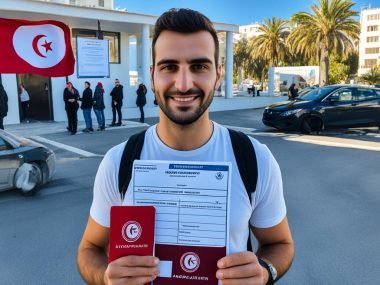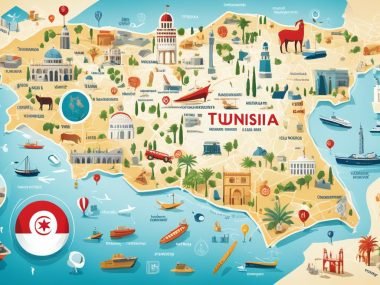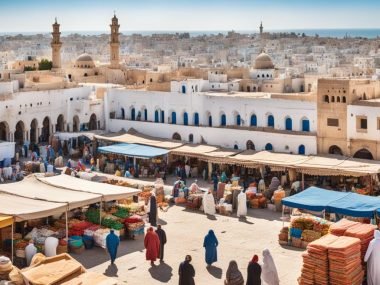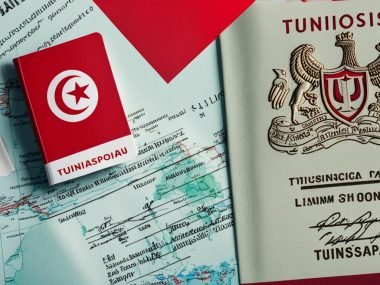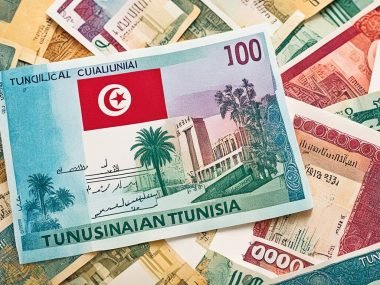Did you know over 5 million tourists visited Tunisia in 2022 alone? This North African country is known for its history and culture. It also has many rules that travellers must follow. Our guide will help you understand these rules, making your visit smooth.
The Foreign, Commonwealth & Development Office (FCDO) updates travel advice for Tunisia often. Following local laws shows respect and keeps you safe. Tunisia has rules about behaviour, business, and transport. These rules help everyone get along.
If you’re visiting or staying longer, knowing local laws is key. Avoiding fines and fitting into the culture can make your trip better.
Key Takeaways
- Knowing local laws is key for a safe and compliant stay in Tunisia.
- The FCDO provides regular travel advisories highlighting the importance of following Tunisian legislation.
- Tunisian laws cover a wide range of areas including civil behaviour, commerce, and transport.
- Following these rules can help avoid fines and other legal complications.
- Understanding Tunisia’s rules can improve your travel or stay.
Travel Warnings and Insurance
Travelling to Tunisia requires knowledge of travel warnings. You must also arrange comprehensive travel insurance. Our guidelines are crucial for a safe journey.
Areas to Avoid
The Foreign, Commonwealth & Development Office (FCDO) advises not to visit certain Tunisian areas. These are near the Algeria and Libya borders, where terrorist risks exist. Avoid places like Chaambi Mountains National Park and Mount Salloum among others.
Importance of Travel Insurance
Having valid travel insurance for Tunisia is vital. Without it, high-risk area travel can void claims. Make sure to heed the FCDO’s warnings to keep insurance valid. Check that your insurance includes emergencies and follows Tunis’s restrictions.
Entry Requirements
It’s key to know the Tunisia visit rules for a smooth trip. Rules change often, so check often.
COVID-19 Rules
Right now, Tunisia does not ask for COVID-19 tests or vaccine proof. This makes travel easier. Still, keep an eye on any rule changes in Tunisia as they might change fast.
Passport Validity
A ‘British citizen’ passport that’s valid for your whole stay is needed to enter Tunisia. Make sure your passport is up-to-date. You can visit Tunisia without a visa for up to 90 days. But, get your passport stamped when you arrive to avoid fines for overstaying.
Visa Requirements
UK travellers don’t need a visa for short visits to Tunisia, up to 90 days. This makes trip planning simpler. For longer visits, talk to the Tunisian Embassy in the UK. Rules can change, so it’s important to stay informed.
Safety and Security
Tunisia focuses a lot on staying safe and secure. It takes strong steps and acts fast against any possible dangers. It’s very important for anyone visiting or living in Tunisia to know the risks and how to avoid them.
Regional Risks
The area near the borders with Algeria and Libya is more dangerous due to terror threats. This requires careful behaviour. The Foreign, Commonwealth & Development Office (FCDO) gives updates on safety, telling travellers which places to avoid. Staying updated and careful is key.
Precautionary Measures
Being careful can really help keep you safe in Tunisia. Here are some tips:
- Keep up-to-date with FCDO advisories and local news.
- Don’t go to places known to be unsafe.
- Listen to what security forces say, like at checkpoints.
- Try not to stand out and avoid touchy subjects in public.
Following the laws and being mindful of dangers can help you stay safe in Tunisia. Knowing what’s going on and acting wisely is very important for your security.
Local Restrictions
It’s crucial to know the local rules if you want to visit or live in Tunisia. Each area has its own set of rules. They can change quickly.
Health Measures
Health rules in Tunisia can come quickly because of changing health worries. Following these rules is a must as per Tunisian laws. Always check the latest advice from health officials to stay safe and follow the rules.
Strikes and Demonstrations
Sudden strikes and demonstrations often happen in Tunisia. They can greatly affect public services like buses and trains. It’s important to keep up with news on any strikes or protests. Check with your travel service and keep up with local news to avoid problems.
| Concern | Description |
|---|---|
| Health Measures | Rapid implementation of health measures to counter emerging concerns. |
| Strikes and Demonstrations | Unpredictable events that can affect travel plans and daily activities. |
| Local Restrictions | Varied guidelines across different governorates, requiring adherence to local advisories. |
Rules for Desert Travel
Exploring Tunisia’s desert is amazing but has key rules for safety. Knowing these rules is vital before you start your desert trip.
Permission and Registration
Getting permission is needed for some desert spots in Tunisia. You must register with the National Guard’s Tourism Brigade. This is in places like Douz, Tozeur, or Tataouine. It helps the authorities know your plan. They can help you more easily then, making your desert trip safer.
Travel Guide Requirements
A licensed guide is a must for safe desert journey in many areas. These guides know the desert well. They keep you safe and make your trip fun. Make sure a professional guide is with you to explore the desert the right way.
Driving Regulations
The driving rules in Tunisia are unique. You need to know them for a safe journey. We look at important points like permits and road safety.
International Driver’s Permit
If you want to drive in Tunisia, you must have an international driver’s permit (IDP). This makes your local license widely accepted. Get your IDP before you go to avoid trouble.
Road Safety and Local Practices
Driving in Tunisia is different from the UK. You might face dark roads and unpredictable drivers. Road safety in Tunisia needs extra care, especially at night. Here are some top tips:
- Always wear a seat belt.
- Watch out for drivers changing lanes suddenly.
- Avoid driving in the dark.
- Learn what local road signs mean.
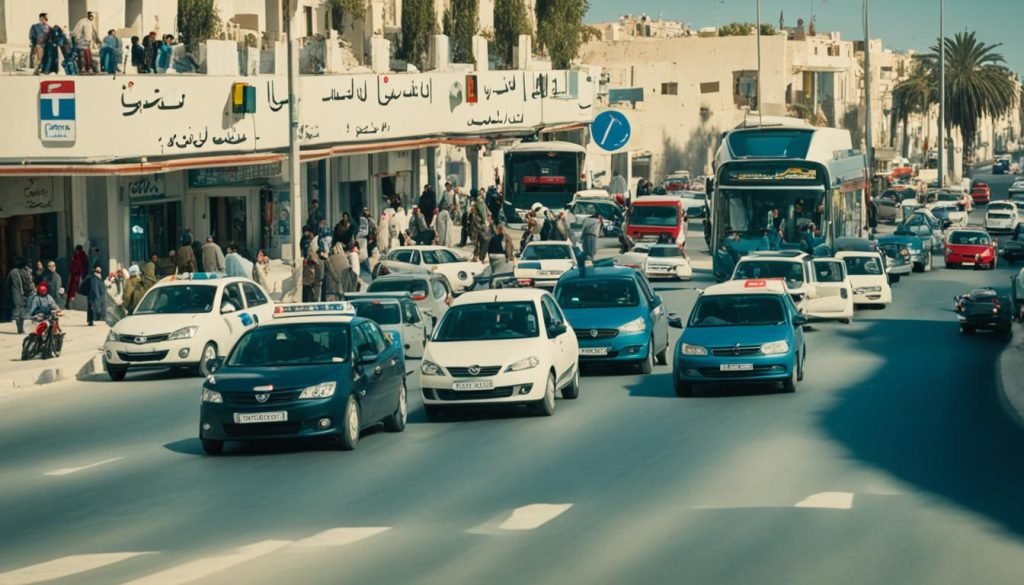
Encountering Security Checks
You might see a lot of security checks while travelling. They help keep everyone safe. Here’s how to handle these checks smoothly:
- Drive up to checkpoints slowly and follow the officers’ directions.
- Have your IDP, car papers, and passport easy to get to.
- Be nice and ready to help for a quick check.
Knowing about Tunisia driving regulations helps make your trip better and safer.
Public Transport Guidelines
Tunisia has a good public transport system. TRANSTU looks after city travel. SNTRI
Tunisia public transport, managed by TRANSTU and SNTRI, serves both urban and remote areas efficiently.
Everyone should watch out and do these:
- Stay alert to your surroundings, especially in crowded spaces.
- Keep personal belongings secure and within sight.
- Use licensed taxis where possible to avoid overcharges.
At airports, hotels, or tourist places, always choose licensed taxis. This avoids extra charges.
Let’s look briefly at Tunisia’s two main public transport providers:
| Operator | Service Area | Key Features |
|---|---|---|
| TRANSTU | Urban Areas | Frequent, crowded, reliable |
| SNTRI | Interurban and Remote Areas | Long-distance, frequent stops, secure |
To sum up, using Tunisia public transport like TRANSTU and SNTRI means being careful. But, if you’re attentive, it’s a handy way to move around.
Rules for Air Travel
We must know the air travel rules in Tunisia for a smooth trip. Major airports have strong security. Knowing this helps us travel easily.
Security Screening
Security screening is now stricter to protect us and the flights. They check our bags and stuff carefully. We should follow security advice to avoid trouble and be safe. Learn about security rules before going to the airport.
Aviation Safety
The Aviation Safety Network shares safety info on airlines in Tunisia. Though not endorsed by DFAT, they suggest checking it. This helps us know about flight safety and makes travel safer.
Following Tunisia’s air travel rules makes our trips safe and fun. Knowing about security checks and using resources like the Aviation Safety Network helps a lot.
Rail Travel Regulations
Tunisia has a big railway network. It connects big cities in the north, the east coast, and inside the country. This lets people travel to many places in Tunisia. But, travellers should know some safety tips for a good and safe trip.
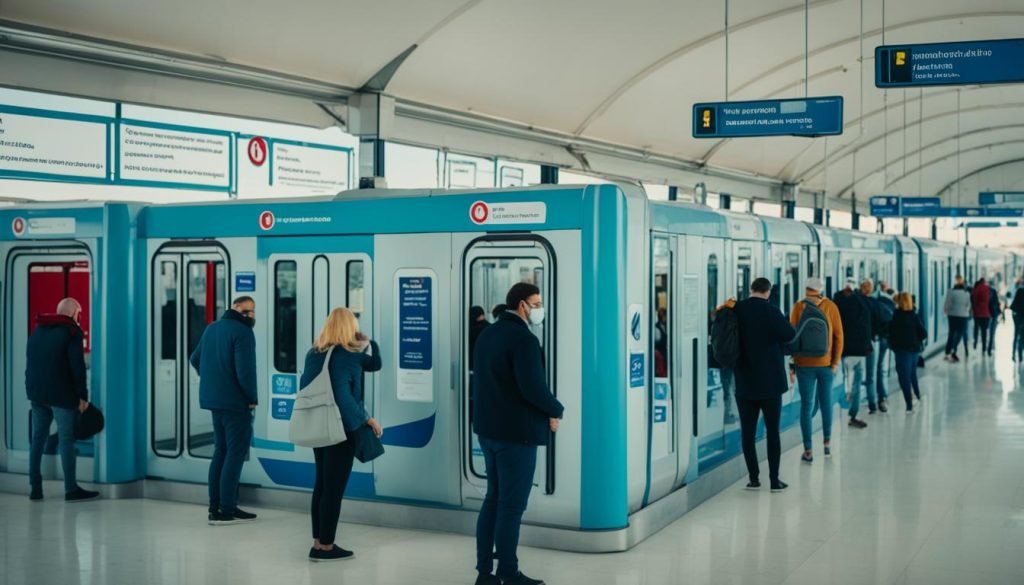
Network and Connections
The railway network reaches many important places. These include Tunis, Sfax, Sousse, and Gabès. This makes it easy to get to both city and country areas. It is noteworthy that trains between these cities run often. This means both locals and tourists can rely on it. Still, it’s smart to check train times before you go.
Safety Precautions
Safe travel on Tunisia’s trains is very important. Be careful of theft, especially where it’s crowded, like stations and trains. Always watch your things. Going to far places? Remember, trains there may not run often. Knowing this and keeping safe will make your trip better.
| City | Major Connection | Frequency | Safety Tips |
|---|---|---|---|
| Tunis | Sfax, Sousse, Gabès | High | Keep valuables secure |
| Sousse | Tunis, Sfax | Moderate | Stay vigilant in crowded areas |
| Sfax | Tunis, Gabès | Moderate | Check schedules in advance |
| Gabès | Tunis, Sfax | Low | Be cautious in remote areas |
Customs and Currency Regulations
Tunisia has strict rules for customs and money that visitors must follow. It’s key for easy entry and leave. Some goods must be shown to officials when you arrive to avoid trouble.
Declared Goods
Travelers need to tell customs about certain items. This includes expensive electronics and items over the limit. Not doing so can lead to big fines or losing your things. Always check the latest rules from Tunisian customs before you go.
Currency Controls
Tunisia has rules about taking money out. You can’t take Tunisian dinars out without showing you changed money correctly. This helps keep Tunisia’s economy stable. Always keep your money exchange slips to show at customs if asked.
Using Drones
There are extra rules for flying drones in Tunisia. You must get permission before bringing a drone. If not, officials will take it until you leave. These rules help protect safety and privacy in Tunisia.
Understanding these rules means you can have a good time in Tunisia without issues. For new info, it’s best to look at the Tunisian customs website.


